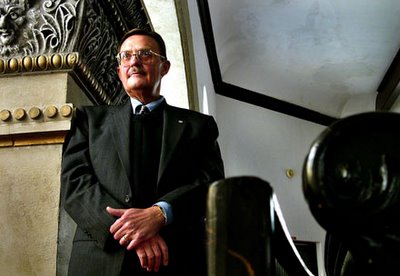
Right pew, wrong church. Woes in the ABC are reflected amongst our congregational cousins. A report from Virginia. The photo is Rev. Michael Halley, mentioned in the article.
The Rev. Michael Halley of Suffolk Christian Church said his congregants concluded their values diverged from those of the UCC
DELORES JOHNSON/THE VIRGINIAN-PILOT
By STEVEN G. VEGH , The Virginian-Pilot © January 5, 2006
The United Church of Christ’s endorsement of same-sex marriage this summer may have been a first for American mainline Protestantism. It was also the last straw for Suffolk Christian Church.
Responding to the July vote by the UCC’s General Synod, the 145-year-old church agreed by more than a two-thirds majority this fall to leave the 1.3 million-member denomination.
The gay-marriage issue was not the only disagreement members had with the UCC, said Suffolk Christian’s minister, the Rev. Michael D. Halley , “although for a lot of people, that was the straw that broke the camel’s back.”
As many as 25 congregations within the UCC’s Southern Conference, which encompasses eastern Virginia and all of North Carolina, have left since the synod’s vote, said the Rev. Stephen Camp , the conference’s administrator. Six new congregations have formed in the same period, leaving the conference with about 230 altogether.
BACKGROUND The United Church of Christ synod, a biennial meeting of delegates from member churches, affirmed “equal marriage rights for couples regardless of gender” in an overwhelming vote.
Congregations also were asked to oppose campaigns that advocate constitutional amendments to limit marriage according to gender. Virginia is among the states with such a campaign. If the General Assembly votes again this year, as it did last year, to ban same-sex civil unions, the measure could go before the state’s voters as a constitutional amendment this fall.
Despite the UCC delegates’ position, the synod does not dictate policy to member churches and ministers are not required to provide marriage rites for gay couples. Each UCC congregation has autonomy, including the freedom to quit the denomination.
Gay marriage and ordination of noncelibate homosexuals are among the most hotly debated issues in several Protestant denominations, including the Evangelical Lutheran Church in America, the Episcopal Church USA and the Presbyterian Church USA.
The UCC synod’s July action made the church the first major Christian denomination to endorse gay marriage. The United Church of Christ was already the only major Protestant denomination to allow ordination for gays and lesbians. The Unitarian Universalist Association also allows gay ordination and same-sex unions, but it is not a Christian denomination.
Among many Protestants, the core of the debate lies in whether the Bible considers same-sex sexual activity acceptable. For the Rev. James Anderson of New Hope Congregational Church in the Berkley section of Norfolk, the answer is no.
“I think that it’s a sin – Scripture says a man should not lay with a man,” said Anderson, whose congregation voted to withdraw from the UCC after the synod’s action. “Personally, I cannot go along in support of something I don’t believe is sanctioned by the Bible.”
At Suffolk Christian, Halley said the synod’s decision led some congregants to conclude that their values diverged from the UCC. Some members questioned whether it was proper for the UCC’s national leadership to take politically themed stands, such as its opposition to the U.S.-led war in Iraq.
“Whatever they do, we have to wear,” Halley said. “If we carry the name out front, people are going to associate us with whatever actions our national church body had taken.”
Not every church unhappy with the synod’s gay-marriage action has quit the denomination. At Windsor Congregational Christian Church UCC in Isle of Wight County, the board of deacons opted instead to send a letter of protest to the denomination’s president.
The church also cut out financial contributions to the national church that might be used to promote the UCC’s stand on gay marriage.
“We won’t turn our back on the UCC,” said the Rev. Basil Ballard , the church’s minister. “We still feel we’re part of it, even though this is one little portion we can’t abide.”
At least 16 churches outside the Southern Conference have quit the UCC, but the total nationwide won’t be known until the denomination gets year-end reports from its regional offices, said the Rev. J. Bennett Guess , the UCC’s national spokesman.
Guess said the losses are not catastrophic and stressed that the same theme of inclusiveness that repels some UCC congregations also has attracted newcomers.
“We’ve received overtures from existing congregations and groups of people who are interested in forming UCC congregations across the country,” Guess said.
In October, the UCC took six churches into the denomination, the biggest monthly gain since the UCC was formed in 1957 , he said.
The South, where the UCC is most thinly spread, “probably has the largest hunger for new church development of the UCC kind: inclusive congregations, congregations that are multiracial, congregations that are open to all persons,” said Camp, the conference administrator .
In the Southern Conference, five UCC congregations have been created since the synod met and several more are planned for 2006, Camp said.
He said the synod’s action cleared the air of a topic that had overshadowed other UCC priorities such as evangelization, poverty and disaster relief.
“We’re seeing the results in a new spirit and vitality in the Southern Conference,” Camp said.
“Those churches that have left, we wish them well, not ill.”
Reach Steven G. Vegh at (757)446-2417 or steven.vegh@pilotonline.com.
Source: http://home.hamptonroads.com/stories/story.cfm?story=97683&ran=67844
No comments:
Post a Comment